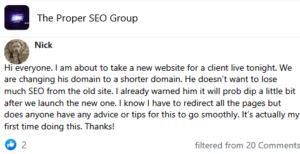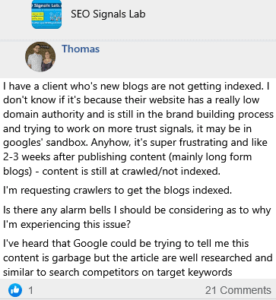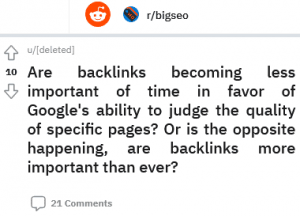u/Stalker
Why does Google put blogs with thin content on the first page of search results?
I've heard SEO professionals saying Google opposes thin content. However, I've noticed some of the thin content blog posts (300-500 words) ranking on the first pages of Google results. What causes this to happen? Are our beliefs wrong?
43 💬🗨
📰👈
Short =/= Thin. And long doesn't mean better. I keep running into articles on simple topics that are 3000+ words long and it's exhausting to untangle those things looking for the bit of information I want.
On tech stuff in particular. I look for written guides because video tutorials on tech take forever to get to the point. And now a lot of tech blog posts are doing the same. Ugh.
Agreed. I write a lot and even every SEO writing tool I've used prompts a certain length – and it's usually way longer than I need to convey my idea. I regularly see short content with very little text winning out over longer comprehensive content – especially if the search phrase is simple.
When I ask someone what 2+2 is, I want them to say 4 without doing a 6-page mathematical proof on what addition really is and how that number is arrived at.
Yep. I think the "longer = better" thing is partly a oversimplification, and maybe partly a quirk of the system. If I take longer to find what I need then I was technically "engaged" longer. If Google tracks engagement — and why wouldn't they? — that may give them positive signals. But that doesn't mean my needs were better met. And the long content problem has reached a point where I rather just open 5 tabs and find a post that gets to the point, rather than navigate content so long that it needs a table of contents.
But then again, I do read an usual amount of blog content. I'm sure the average user isn't nearly as bothered by this.
ibanez
I guess the big question though is where someone like you lies on the spectrum compared to the average surfer when it comes to clicking to page 2 in the search results, or even scrolling past the top 3 on page 1 for that matter. You're probably in the 1% or less and that doesn't translate to sales for businesses trying to land on a top slot.
partly a quirk of the system.
That's definitely a fundamental problem with search engine results. The fact is every measurable signal can be manipulated in some way whether it be keyword density, backlinks, etc… and as a result, good content frequently never makes it's way into the Search Engine Result Pages (SERPs). I find SEO super interesting (and necessary for my freelance work), but it's also infuriating when I find myself changing around good content in an attempt to game an arbitrary system.
TadeuRezend
Yep. On both counts. I'm an oddball case so my frustration isn't a sign that the system needs to change. And having to lower a content's quality for SEO reasons is a pain.
But then again, if the content is good and changing will help it reach more people through organic traffic, then maybe it's worth it. I mean, if a great article about trees falls in the forest and no one reads it, was there a point to it being great?
Man that talk got long winded. I guess it's what happens when content writers decide to geek out 😂.
I do think that the trend of 3000+ articles will start to bother the average user eventually. But that probably years out. And who knows what will change before then. Maybe some other factor will kill the trend before it gets on regular people's nerves.
ibanez
IMHO the only way the system will change for the better – meaning for both users like yourself and the average user, is either every search result is delivered by a human being (which is impossible on a global scale) or more search competitors gain enough traction to rival Google AND those search competitors use rating mechanisms that are opposite those which Google uses (so you can't game one without hurting your position in the other). A tall order on either option.
NHRADeuce
If Google tracks engagement — and why wouldn't they?
Because they don't want to lose an antitrust suit. The ONLY way to accurately track engagement is to collect data from the browser or code on the site. The only thing they can track from search results pages are bounces (not necessarily bad) and pogos (probably bad).
If Google uses engagement data from Google Analytics (GA) or Chrome, that puts sites that don't use GA or have lower share of users using Chrome at a disadvantage. That would land them with an antitrust suit that potentially allows the government to subpoena the Google algorithm.
Google tracking on site engagement is not a technical question, it's a legal one. Until Google figures out how to track 100% of users on 100% of sites without requiring sites and users utilize their software, they will not use engagement as a rank signal.
TadeuRezend
They can track what I clicked on the search results and how long I took to go check other search results after opening a given article. But yeah. If I click an article and that's the end of my search, they shouldn't know whether or not I was there for 5 minutes or 50.
Plus I wonder how much even Google understands what they track. They know what data they're feeding the algorithm and what goals they want it to achieve. With machine learning, it should be impossible to determine for sure what inferences the algorithm is deriving from that data.
NHRADeuce
Exactly. If you go back to a search result page and click another result (pogo), you can make an argument that the user didn't find what they were looking for so the result is bad. Or it could be a user price shopping and every result is good. So even a pogo is fairly ambiguous.
It only gets worse from there because engagement metrics are highly dependent on intent. If you're looking for an address or phone number or price, long dwell time or multiple pages visited are bad. If your reading how to articles then long dwell time and multiple pages is great.
Google has a hard enough time identifying good content consistently, the technology is simply not there yet to decipher on site engagement – if they had a way to collect that data without triggering antitrust lawsuits.
📰👈
ibanez
You can't define thin content as being posts that are 300-500 words long. As u/TadeuRezend has already said, short does not equal thin. Does the result on the first page of Google actually answer the search query? If so, then it has every right to be there.
The only time I'd think length might come in to play would be if you held all other aspects of the article in comparison equal which is basically impossible without plagiarizing content.
TheAnt
Long =/= Quality. Just because something is 1,000 words long doesn't mean it's quality. As everyone else has said, short & precise is better. Word vomit isn't quality.
doombop
I very rarely deliberately write more than 500 words – maybe for a long-form article or an Frequently Asked Question (FAQ) or something. I don't know what sectors you're working for, or what you're Googling, but in my experience most websites don't have many thousands of words on most of their pages, and this isn't what people are looking for when they make a search.
If I want to read thousands of words I'll go on Wikipedia or something, not a corporate website.
I dunno where you heard Google opposes pages and articles of between 300 and 500 words, but that's the sweet spot for my products, pages, categories, doorway pages, blogs etc. I don't do less than 300 usually.
Borange
300 to 500 words is not thin, i personally don't like reading novels when finding info, and most users want to find stuff quick and too the point when searching, as long as its not spam, before people would load up over 1000 words to game adsense but adsense no longer uses the words on your site to place ads.
Iwillbewealthy
The point of the long form isn't to rank for 1 keyword its a wide net designed to to catch long tails and keyword phrase concepts that don't even show up on keyword lists.
E.g. I might have a website selling leather watch straps.
There may be loads of longterm variants that contain a combination of size, colour and texture of leather watch strap.
18mm, 20mm, 22mm
Blue, green, black, red oraabge etc.
Crococile, cow, smooth, embossed etc.
So use these 3 variables you can make a long list of keywords.
18mm green crocodile leather watch strap
22mm leather watch strap red cow grain
These all probably have such tiny searches a month it won't even show up on keyword lists but if you can mentioned all these attributes and talk about them then you could rank for these wide variety of longtails – each one will have tuiny amounts of traffic, but limtless variety of keywords can get decent traffic
ozzemg
Because they answer the question.
I've been running an experiment for a while now writing 600 word blog posts that are straight to the point and answer the search query with no beating around the bush. Had enormous success doing this and now beating competitors with 2000+ word posts.
For example, how often do you see an article like "How To Build A Chicken Coop", and then you end up on a 6000 word mega guide where half the article covers subheadings like "Why Chicken Coops Are Important", "The History Of Chicken Coops", etc.
Irrelevant and unnecessary.
Yeah, I never understood why guru's recommend this.
If I'm searching for "how to smoke chicken over a woodfire"
I don't want a 2000 word article on why a wood smoker is better then a gas smoker. I already know, hence my original query.
Yeah, I never understood why guru's recommend this.
Oh, that's easy. They saw Wirecutter (and similar websites) producing these 10,000 word product roundups and they assumed they were disrupting the already stagnate affiliate website racket. They assumed that the reason those articles were dominating search results because they were long. Not because they were well researched, well written, and updated based on new information.
HeadBump
Your assumption is extremely rare. Google's hungry bots were programmed to give MUCH higher priority to content quantity over content quality. That's a fact!
From Google's point of view, it simplifies their work. Their bots are not really intelligent, so if they read longer texts they can (may) better understand what it's all about.
From users' point of view, it's a nightmare. Each click on the first results lands you on overloaded pages which are usually a huge waste of time.
This is a truly annoying paradox with Google's search. Your web pages may offer great products or services, which you can describe precisely and clearly in just a few short paragraphs. But you won't make the top SERPs and no one will find you. Fill up your pages with useless blah-blah, and you have a very good chance to make the top of the Search Engine Result Pages (SERPs). Only that most users will run for the hills.
📰👈
Some People Start Building E-A-T With the Content Of Donts or Things Not to Do
Two SEO Myths That Just Won’t Die: Social Signals Are a Ranking Factor; Links Do Not Matter. Content Is King. Great Content Will Always Rank Well
Perfectionism in Blogging or Creating Content
How Deep Can Artificial Intelligence Write Detail Content for Your Website?








